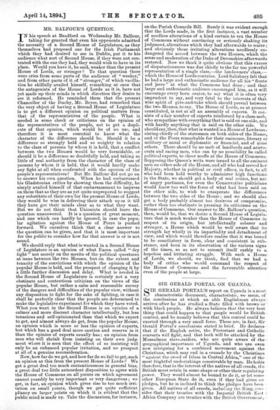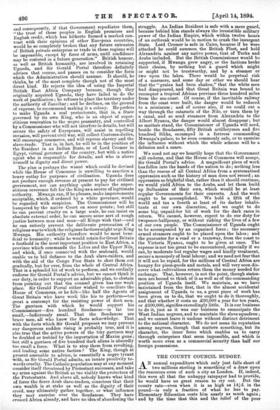SIR GERALD PORTAL ON UGANDA.
SIR GERALD PORTAL'S report on Uganda is a most characteristic document, characteristic, we mean, of the conclusions at which an able Englishman always arrives after he has studied a State filled with brown or ' with black people. He always believes that the very best thing that could happen to that people would be British . control, and he usually believes that this control could be exerted through a very small force. These are, in.fact, Sir- Gerald Portal's conclusions stated in brief. He declares that if the English retire, the Protestant and Catholic converts will fight, and that both will be attacked by the Mussulman slave-raiders, who are quite aware of the geographical importance of Uganda, and who are even now intriguing for a combined movement against the Christians, which may end in a crusade by the Christians " against the creed of Islam in Central Africa," one of the most frightful undertakings conceivable by man. He holds therefore, that in the interest of the natives of all creeds, the British must retain in some shape or other their regulating power. They would almost be bound to do it, or let some other European State do it, even if they had given no • pledges, but he is inclined to think the pledges have.been • given. All natives of all creeds, including the.King, con- eider that their treaties with the Imperial British East I Africa Company are treaties with the British Government, and consequently, if that Government repudiates them, "the trust of these peoples in English promises and English credit, which has hitherto formed a marked con- trast with their opinions of other European countries, would be so completely broken that any future extension of British private enterprise or trade in these regions will be impossible, except by force of arms, until confidence may be restored in a future generation." British honour, as well as British humanity, are involved in retaining Uganda, and Sir Gerald Portal therefore definitely advises that course, and passes on to consider the form which the Administration should assume. It should, he thinks, be of the most complete though not of the most direct kind. He rejects the idea of using the Imperial British East Africa Company because, though they originally acquired Uganda, they have failed to do the work of pacification ; he refuses to place the territory under the authority of Zanzibar ; and he declines, on the ground of expense, to recommend making it a colony. He prefers to make Uganda a real protectorate, that is, a State governed by its own King, who is an object of super- stitious veneration to the negro peasantry, and controlled by a Commissioner who will not interfere in details, but will secure the safety of Europeans, will assist in repelling invasion, will prevent civil war, will collect Customs-duties, will encourage commerce, and will repress slavery and the slave-trade. That is, in fact, he will be in the position of the Resident in an Indian State, or of Lord Cromer in Egypt, virtual governor of the country, but with a native agent who is responsible for details, and who is above himself in dignity and direct power.
The plan is perhaps the wisest which could be devised while the House of Commons is unwilling to sanction a heavy outlay for purposes of civilisation. Uganda does not produce enough revenue at present to pay for civilised government, nor can anything quite replace the super- stitious reverence felt for the King as a source of legitimate authority. Mwanga can, if he pleases, make improvements acceptable, which, if ordered by a white governor, would be regarded with suspicion. The Commissioner will be hampered by the native Court on some points ; but still he can prevent cruelty on a large scale, he can insist on absolute external order, he can secure some sort of rough justice between man and man—all Kings wish that—and he can entirely prevent the deliberate provocation of a religious war to which the religious factions might urge King Mwanga. His authority therefore would be most bene- ficial to humanity ; while he would retain for Great Britain a foothold in the most important position in East Africa, a province which commands the L kes and the Upper Nile, and which, if once connected with the seaboard, would enable us to bid defiance to the Arab slave-raiders, and with the aid of the Congo Free State to shut them out :gradually, but for ever, from the whole of Central Africa. That is a splendid bit of work to perform, and we cordially endorse Sir Gerald Portal's advice, but we cannot think it our duty, in order to support an admirable plan, to abstain from pointing out that the counsel given has one weak place. Sir Gerald Portal either wished to conciliate the House of Commons, or he felt—like half the Agents of Great Britain who have work like his to perform—too great a contempt for the resisting power of dark men. ' The garrison with which he would support his -Commissioner—five hundred Soudanese—is far too small,—ludicrously small. That the Soudanese are brave men, all who know the facts acknowledge. That with the forts which Sir Gerald proposes we may prevent any dangerous sudden rising is probably true, and it is also true that the active powers of the tiny garrison may be doubled or trebled by the importation of Maxim guns ; 'but still a garrison of five hundred-dark aliens is absurdly too small a force. What is to stop them from revolting, -and leading some native faction ? The King, though at .present amenable to advice, is essentially a negro tyrant -with, as Sir Gerald Portal admits, an innate proclivity to- wards cruelty. The Catholic population may at any moment consider itself threatened by Protestant successes, and take up arms against the British as too visibly the protectors of the Protestants. And above all, nobody knows what kind of force the fierce Arab slave-traders, conscious that their own wealth is at stake as well as the dignity of their creed, may ultimately gather together, or what influence they may exercise over the Soudanese. They have crossed Africa already, and have no idea of abandoning the struggle. An Indian Resident is safe with a mere guard, because behind him stands always the irresistible military power of the Indian Empire, which within twelve hours of an outbreak would be in motion to crush the insurgent State. Lord Cromer is safe in Cairo, because if he were attacked he could summon the British Fleet, and hold Alexandria against any native power, that of Turks and Arabs included. But the British Commissioner would be supported, if Mwanga grew angry, or the factions broke their chains, by nothing but a guard which might or might not be trustworthy, and by a steamer or two upon the lakes. There would be perpetual risk of a massacre, and some day or other we should hear that the "grains had been shaken," that the white men had disappeared, and that Great Britain was bound to reconquer a tropical African province three hundred miles from the sea-coast. Of course, if the inevitable railway from the coast were built, the danger would be reduced to a minimum ; and of course also, if we could cut a way through the cataracts of the Nile, or turn them by a canal, and so send steamers from Alexandria to the Albert Nyanza, the danger would almost disappear ; but as matters stand, the Commissioner of Uganda will need, beside the Soudanese, fifty British artillerymen and five hundred Sikhs, encamped in a fortress commanding Mwanga's palace, to be even commonly safe, or to exercise the influence without which the whole scheme will be a delusion and a snare.
We need not say we heartily hope that the Government will endorse, and that the House of Commons will accept, Sir Gerald Portal's advice. A magnificent piece of work has fallen into the hands of the nation to do ; nothing less than the rescue of all Central Africa from a systematised oppression such as the history of man does not record ; an oppression so frightful that, rather than it should continue, we would yield Africa to the Arabs, and let them build up Sultanates of their own, which would be at least regular Governments for their converts. And the work ought to be accomplished. We hold a fifth of the world and tax a fourth at least of its darker inhabi- tants at our own discretion, and we ought to do some big, unpaid-for bit of work for the dark races in return. We cannot, however, expect to do our duty for twopence-halfpenny, or without risking the lives of a few of our own people. The Commissioner of Uganda ought to be accompanied by an organised force ; the necessary armed steamers ought to be placed upon the lakes ; and the guarantee for a road or a tramway, from the coast to the Victoria Nyanza, ought to be given at once. The expense is not too great to be encountered, especially if we can, by moderate but regular wages and kindly treatment, secure a monopoly of local labour; and we need not fear that it will not be repaid, for the millions of Central Africa are hungry for piece-goods and metals, and will very soon dis- cover what cultivations return them the money needed for exchange. That, however, is not the point, though states- men are bound to think of it as well as of the commanding position of Uganda itself. We maintain, as we have maintained from the first, that in the almost accidental assignment of Uganda to us, a great piece of work has been given us to do, that we ought to do it thoroughly, and that whether it costs us £30,000 a year for ten years, or £100,000, signifies exceedingly little. It is our business to do it, just as it was our business to emancipate the West Indian negroes, and to maintain the slave squadron ; and we cannot leave it undone without distinct detriment to the national character. We do not mean its reputation among negroes, though that matters something, but its character, the inner force which enables us to carry through enterprises that seem impossible, and which is worth more even as a commercial security than half our foreign possessions.



































 Previous page
Previous page